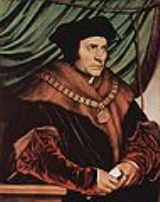
and noted Renaissance humanist
. He was an important councillor to Henry VIII of England
and, for three years toward the end of his life, Lord Chancellor
. He is recognised as a saint
within the Catholic Church and is commemorated by the Church of England as a "Reformation martyr". He was an opponent of the Protestant Reformation
and in particular of Martin Luther
and William Tyndale
.
More coined the word "utopia
" – a name he gave to the ideal and imaginary island nation, the political system of which he described in Utopia
published in 1516.
Now there was a young gentleman which had married a merchant's wife. And having a little wanton money, which him thought burned out the bottom of his purse, in the first year of his wedding took his wife with him and went over sea, for none other errand but to see Flanders and France and ride out one summer in those countries.![]()
For men use, if they have an evil turn, to write it in marble: and whoso doth us a good turn we write it in dust.![]()
And when the devil hath seen that they have set so little by him, after certain essays, made in such times as he thought most fitting, he hath given that temptation quite over. And this he doth not only because the proud spirit cannot endure to be mocked, but also lest, with much tempting the man to the sin to which he could not in conclusion bring him, he should much increase his merit.![]()
See me safe up: for in my coming down, I can shift for myself.![]()
This hath not offended the king.![]()

